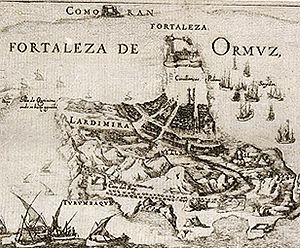Capture of Ormuz (1622)
| Capture of Hormuz | |||||||||
|---|---|---|---|---|---|---|---|---|---|
 The city and fortress of Ormuz, 17th century |
|||||||||
|
|||||||||
| Belligerents | |||||||||
|
|
Ormus |
||||||||
| Commanders and leaders | |||||||||
|
Imam-Quli Khan Captain Blythe |
Governor Simão de Melo | ||||||||
| Strength | |||||||||
| 3000 Persians 5 English warships and 4 pinnaces |
Over 1000 | ||||||||
| Casualties and losses | |||||||||
| Unknown but light | Light, 1000 surrendered; Kingdom of Ormus deposed; Portuguese presence in the Gulf reduced to Muscat |
||||||||
In the 1622 Capture of Ormuz, an Anglo-Persian force combined to take over the Portuguese garrison at Hormuz Island after a ten-week siege, thus opening up Persian trade with England in the Persian Gulf. Before the capture of Ormuz, the Portuguese had held the Castle of Ormuz for more than a century, since 1507 when Afonso de Albuquerque established it in the Capture of Ormuz, giving them full control of the trade between India and Europe through the Persian Gulf. "The capture of Ormuz by an Anglo-Persian force in 1622 entirely changed the balance of power and trade".
The English side consisted of a force supplied by the English East India Company consisting of five warships and four pinnaces. The Persians had recently gone to war with the Portuguese, and a Persian army was besieging the Portuguese fort in Kishm, but English help was needed to capture Ormuz.Shah Abbas wished to obtain English support against the Portuguese, and the commander Imam Kuli Khan, son of Allahverdi Khan, negotiated with the English to obtain their support, promising the development of silk trade in their favour. An agreement was signed, providing for the sharing of spoils and customs dues at Hormuz, the repatriations of prisoners according to their faith, and the payment by the Persians of half of the supply costs for the fleet.
The English fleet first went to Kishm, some 24 kilometres (15 mi) away, to bombard the Portuguese position. The Portuguese quickly surrendered, and the English casualties were few, but included the famous explorer William Baffin.
The Anglo-Persian fleet then sailed to Ormuz and the Persians disembarked to capture the town. The English bombarded the castle and sank the Portuguese fleet, and Ormuz was finally captured on 22 April 1622. The Portuguese were forced to retreat to another base at Maskat.
...
Wikipedia
